Good People of the World,
This is refreshing God send news. Such UN
Representatives of the likes of Martin Kobler, should be given thumbs up. I watched him closely, and his reporting has
been very positive with intention of genuinely helping Congo people. He has played fair and gave the correct
information as is on the ground and for which I believed helped a great deal to
finalize the insurgencies of M23.
It
is clear now that M23 was engineered by Kagame and Museveni as the M23 are seen
running back to their homes.
Whatever else that will come in the name of
M28 as is speculated, shall face worse consequences. I am convinced that the whole world will call
for their extinction, because, the world is sick and tired from being sick and
tired with trouble makers. It is said that, all top leaders have run to Rwanda and Uganda and a new formation called M18 has been founded.
Congratulation to all the UN Rep. and the
United Army and Peace to Congo people and the world. I wish to take
this opportunity also to thank UN Secretary Ban-Ki-moon for all the efforts he
undertook to make this happen, and we shall not hesitate to pressure for Human
Rights and Unity of purpose where all have an opportunity to live dignified,
respectful and honorable life.
May God continue to grant us the Love and
Peace in harmony the world so badly need moving
forward........
Cheers everybody !!!!!
Judy Miriga
Diaspora Spokesperson
Executive Director
Confederation Council Foundation for Africa Inc.,
USA
http://socioeconomicforum50.blogspot.com
Diaspora Spokesperson
Executive Director
Confederation Council Foundation for Africa Inc.,
USA
http://socioeconomicforum50.blogspot.com
Congo army makes inroads against weakened rebels
On Wed, Oct 30, 2013
at 1:04 PM, Zitto <zittokabwe@gmail.com> wrote:
By Katrina Manson in Nairobi
The Democratic Republic of Congo has all but defeated a 20-month
rebellion that threatened Kinshasa’s tentative hold on its
mineral-rich eastern province and terrorised civilians, according to
the United Nations’ special envoy to the country.
Following a four-day military onslaught, Congo’s usually beleaguered
military pushed back the M23 rebels from their strongholds into the
hills beside neighbouring Rwanda. “It is practically the military end
of the M23,” Martin Kobler, the UN’s special envoy in the Congo, told
the UN Security Council.
But the emergence of a new and little known rebel movement within the
region underlines that while Congo’s army may have won the battle
against the M23 rebel group, a broader solution that brings lasting
peace to the region is still elusive.
Several rebel and criminal groups prowl eastern Congo for taxes and
resources ranging from charcoal to gold. Officials said 10,000
Congolese refugees have fled into Uganda to escape a new rebel faction
named by Uganda as M18, about which little is known. A Ugandan
official described M18 as a “breakaway group”.
Congolese officials said they would defeat any new rebel groups. “It
will be the same thing as M23 . . . But we will defeat them,” one
official said.
Congo believes that Rwanda, assisted by Uganda, is behind the M23
rebellion, which takes its name from a 2009 peace deal with the M23’s
forerunners, the CNDP, which disintegrated.
The CNDP was backed by Rwanda, which has invaded Congo several times
since the late-1990s. The UN and some western countries have also
claimed Rwanda provided military, strategic and moral support to M23.
Rwanda and Uganda have repeatedly denied such accusations.
Rwanda says it has no expansionist intentions in eastern Congo, where
it has sizeable economic interests, but has previously expressed
sympathy with the M23’s cause. It claims another Congolese rebel
group, the FDLR, is allied to those who perpetrated the 1994 genocide
and continues to threaten Rwanda.
The latest military offensive counts on the assistance of a new UN
intervention brigade supported by soldiers of several African
countries. UN officials said that 100 rebels have surrendered to a
single military base since Congo’s army launched its attack on Friday.
A Tanzanian peacekeeper was killed.
Ida Sawyer, a senior researcher with Human Rights Watch, who visited
the area on Tuesday, said that Congo’s army appeared ready to take the
last rebel enclaves. “The M23 lost a huge amount of territory this
past week; there have been lots of defections; the top leadership may
already have fled into Uganda or Rwanda. It seems the M23 wasn’t
getting as much support from Rwanda as before.”
A UN official said Congo’s army has not yet taken back the final rebel
stronghold, Bunagana, a town on the border with Uganda. The remaining
rebels appear to have disappeared into the countryside, abandoning
their posts in several towns including Rutshuru, where they had
occupied a military base for months.
The onslaught appears to sound the death-knell for drawn-out peace
talks between Congo and M23 held in Kampala as part of a regional
mediation effort headed by Uganda. International envoys from the US,
the UN and the African Union have repeatedly backed months of talks
that have so far come to nothing.
Washington has warned however about relying on a military solution
alone. Russ Feingold, US special envoy to the region, said there was
“enormous risks in simply moving forward believing that a military
solution is a full answer”, adding: “It risks bringing in other forces
in this matter that could lead to a cross-national war.”
Negotiations between the rebels and Congo have snagged over the fate
of fewer than 80 of its top commanders, according to a Congolese
official. Several were former CNDP commanders and some are under UN
and US sanctions.
Sent from my iPhone
By Katrina Manson in Nairobi
The Democratic Republic of Congo has all but defeated a 20-month
rebellion that threatened Kinshasa’s tentative hold on its
mineral-rich eastern province and terrorised civilians, according to
the United Nations’ special envoy to the country.
Following a four-day military onslaught, Congo’s usually beleaguered
military pushed back the M23 rebels from their strongholds into the
hills beside neighbouring Rwanda. “It is practically the military end
of the M23,” Martin Kobler, the UN’s special envoy in the Congo, told
the UN Security Council.
But the emergence of a new and little known rebel movement within the
region underlines that while Congo’s army may have won the battle
against the M23 rebel group, a broader solution that brings lasting
peace to the region is still elusive.
Several rebel and criminal groups prowl eastern Congo for taxes and
resources ranging from charcoal to gold. Officials said 10,000
Congolese refugees have fled into Uganda to escape a new rebel faction
named by Uganda as M18, about which little is known. A Ugandan
official described M18 as a “breakaway group”.
Congolese officials said they would defeat any new rebel groups. “It
will be the same thing as M23 . . . But we will defeat them,” one
official said.
Congo believes that Rwanda, assisted by Uganda, is behind the M23
rebellion, which takes its name from a 2009 peace deal with the M23’s
forerunners, the CNDP, which disintegrated.
The CNDP was backed by Rwanda, which has invaded Congo several times
since the late-1990s. The UN and some western countries have also
claimed Rwanda provided military, strategic and moral support to M23.
Rwanda and Uganda have repeatedly denied such accusations.
Rwanda says it has no expansionist intentions in eastern Congo, where
it has sizeable economic interests, but has previously expressed
sympathy with the M23’s cause. It claims another Congolese rebel
group, the FDLR, is allied to those who perpetrated the 1994 genocide
and continues to threaten Rwanda.
The latest military offensive counts on the assistance of a new UN
intervention brigade supported by soldiers of several African
countries. UN officials said that 100 rebels have surrendered to a
single military base since Congo’s army launched its attack on Friday.
A Tanzanian peacekeeper was killed.
Ida Sawyer, a senior researcher with Human Rights Watch, who visited
the area on Tuesday, said that Congo’s army appeared ready to take the
last rebel enclaves. “The M23 lost a huge amount of territory this
past week; there have been lots of defections; the top leadership may
already have fled into Uganda or Rwanda. It seems the M23 wasn’t
getting as much support from Rwanda as before.”
A UN official said Congo’s army has not yet taken back the final rebel
stronghold, Bunagana, a town on the border with Uganda. The remaining
rebels appear to have disappeared into the countryside, abandoning
their posts in several towns including Rutshuru, where they had
occupied a military base for months.
The onslaught appears to sound the death-knell for drawn-out peace
talks between Congo and M23 held in Kampala as part of a regional
mediation effort headed by Uganda. International envoys from the US,
the UN and the African Union have repeatedly backed months of talks
that have so far come to nothing.
Washington has warned however about relying on a military solution
alone. Russ Feingold, US special envoy to the region, said there was
“enormous risks in simply moving forward believing that a military
solution is a full answer”, adding: “It risks bringing in other forces
in this matter that could lead to a cross-national war.”
Negotiations between the rebels and Congo have snagged over the fate
of fewer than 80 of its top commanders, according to a Congolese
official. Several were former CNDP commanders and some are under UN
and US sanctions.
Sent from my iPhone
================================
Congo army makes inroads against weakened rebels
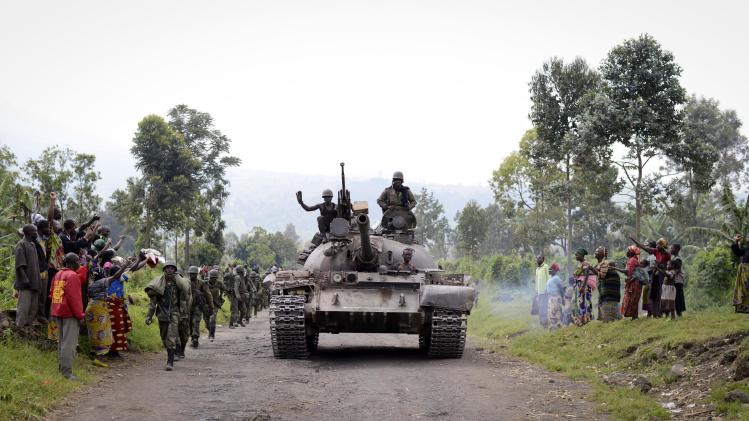
RUMANGABO, Congo (AP) — RUMANGABO, Congo (AP) — The Congolese army colonel
marched triumphantly into town, welcomed by cheering crowds waving palm leaves
after his soldiers retook this base in their latest offensive to quash the M23
rebels.
"Congo for the Congolese!" Col. Mamadou Ndala proclaimed in Swahili to applause and adulation, as women threw flowers and shouted out the names of army commanders.
The recapturing of Rumangabo from the M23 rebels, who are allegedly backed by neighboring Rwanda, is the army's sixth such victory since Saturday. It's a marked turnaround from a year ago when neither the army nor the U.N. peacekeepers kept the same rebels from seizing Goma, a city of 1 million people.
With more help than ever from U.N. forces, Congo's military is now taking advantage of an apparent weakening within the M23 movement that got its start in April 2012. The stepped-up offensive also comes as neighboring Rwanda faces growing pressure over the rebels. The Rwandan government denies it supports the rebels, despite evidence laid out by a U.N. group of experts.
One U.N. diplomat on Monday said the rebels have abandoned nearly all their positions except for a small triangle near the Rwandan border.
John Ging, the director of U.N. humanitarian operations who just returned from Congo, told a news conference at U.N. headquarters in New York Tuesday that the country stands "at a crossroads of new opportunity" where there are hopes for a better future.
He cautioned, however, that Congo has been at crossroads in the past and "tragically, until now, each time it has gotten worse."
"People are saying to us they hope that this time it will actually get better," Ging said. "They see some signs, and where the (U.N.) mission is present, they do point to positive impact."
But he stressed that everyone realizes the instability in Congo, the proliferation of armed groups which will take considerable time to disarm, and the difficult geography of the country.
"If these military victories are followed up with serious regional pressure on Rwanda and on M23 to forge some kind of sustainable peace, then this could be a turning point," said Michael Deibert, author of "The Democratic Republic of Congo: Between Hope and Despair."
Deibert added that Congo's army is often accused of human rights abuses and of a lack of accountability and that these need to be addressed to prevent a reversal of fortune.
The M23 rebels say they want to pursue peace talks, though they have repeated failed and stalled over such issues as amnesty. M23 spokesman Amani Kabasha accused the Congolese government of "provoking fighting with the intention of blaming civilian deaths on M23 and justifying once more the U.N. intervention brigade against our soldiers."
Several Tanzanian peacekeepers have been killed since August. This week the U.N. troops have been in armored personnel carriers and jeeps with mounted machine guns several kilometers (miles) behind the army forces.
Eastern Congo has been wracked by conflict since the 1994 genocide in Rwanda, after which Hutu extremists crossed over into Congo. M23 is only the latest rebel group to menace the mineral-rich region.
The insurgency was born out of an earlier rebel movement that had signed a 2009 peace deal with the government. The fighters said the Congolese government hadn't held up its end of the deal that called for the rebels to be integrated into the national army, among other things.
With the purported help of Rwanda, M23 quickly grew in strength and briefly held Goma in November 2012 before bowing to international pressure and retreating. In March, M23 leader Bosco Ntaganda turned himself in to face charges at the International Criminal Court, a move that experts say has seriously weakened the rebels.
"The movement is unable to control its entire territory and suffers from poor morale and scores of desertions," a U.N. group of experts said in a report in late July.
Estimates now put the M23 group at 1,000 fighters. However, residents living in border regions claim that soldiers cross from Rwanda into Congo during M23 fighting which makes it difficult to estimate the group's current size.
Timo Mueller, a Goma-based researcher with the Enough Project, an advocacy group active in eastern Congo, said the M23's retreat from strategically important towns and hills in recent days is surprising.
"That would suggest that they cannot hold ground and confront a very ambitious and more professional Congolese army," he said. "I understand that they're scattering or have scattered. I wouldn't say it's necessarily the military end."
Even if the M23 is defeated, he said, the rebels would need to be disarmed and for them to give up their weapons they would need security guarantees to prevent attacks by the army or angry citizens.
___
Larson reported from Dakar, Senegal. Edith M. Lederer contributed to this report from the United Nations
"Congo for the Congolese!" Col. Mamadou Ndala proclaimed in Swahili to applause and adulation, as women threw flowers and shouted out the names of army commanders.
The recapturing of Rumangabo from the M23 rebels, who are allegedly backed by neighboring Rwanda, is the army's sixth such victory since Saturday. It's a marked turnaround from a year ago when neither the army nor the U.N. peacekeepers kept the same rebels from seizing Goma, a city of 1 million people.
With more help than ever from U.N. forces, Congo's military is now taking advantage of an apparent weakening within the M23 movement that got its start in April 2012. The stepped-up offensive also comes as neighboring Rwanda faces growing pressure over the rebels. The Rwandan government denies it supports the rebels, despite evidence laid out by a U.N. group of experts.
One U.N. diplomat on Monday said the rebels have abandoned nearly all their positions except for a small triangle near the Rwandan border.
John Ging, the director of U.N. humanitarian operations who just returned from Congo, told a news conference at U.N. headquarters in New York Tuesday that the country stands "at a crossroads of new opportunity" where there are hopes for a better future.
He cautioned, however, that Congo has been at crossroads in the past and "tragically, until now, each time it has gotten worse."
"People are saying to us they hope that this time it will actually get better," Ging said. "They see some signs, and where the (U.N.) mission is present, they do point to positive impact."
But he stressed that everyone realizes the instability in Congo, the proliferation of armed groups which will take considerable time to disarm, and the difficult geography of the country.
"If these military victories are followed up with serious regional pressure on Rwanda and on M23 to forge some kind of sustainable peace, then this could be a turning point," said Michael Deibert, author of "The Democratic Republic of Congo: Between Hope and Despair."
Deibert added that Congo's army is often accused of human rights abuses and of a lack of accountability and that these need to be addressed to prevent a reversal of fortune.
The M23 rebels say they want to pursue peace talks, though they have repeated failed and stalled over such issues as amnesty. M23 spokesman Amani Kabasha accused the Congolese government of "provoking fighting with the intention of blaming civilian deaths on M23 and justifying once more the U.N. intervention brigade against our soldiers."
Several Tanzanian peacekeepers have been killed since August. This week the U.N. troops have been in armored personnel carriers and jeeps with mounted machine guns several kilometers (miles) behind the army forces.
Eastern Congo has been wracked by conflict since the 1994 genocide in Rwanda, after which Hutu extremists crossed over into Congo. M23 is only the latest rebel group to menace the mineral-rich region.
The insurgency was born out of an earlier rebel movement that had signed a 2009 peace deal with the government. The fighters said the Congolese government hadn't held up its end of the deal that called for the rebels to be integrated into the national army, among other things.
With the purported help of Rwanda, M23 quickly grew in strength and briefly held Goma in November 2012 before bowing to international pressure and retreating. In March, M23 leader Bosco Ntaganda turned himself in to face charges at the International Criminal Court, a move that experts say has seriously weakened the rebels.
"The movement is unable to control its entire territory and suffers from poor morale and scores of desertions," a U.N. group of experts said in a report in late July.
Estimates now put the M23 group at 1,000 fighters. However, residents living in border regions claim that soldiers cross from Rwanda into Congo during M23 fighting which makes it difficult to estimate the group's current size.
Timo Mueller, a Goma-based researcher with the Enough Project, an advocacy group active in eastern Congo, said the M23's retreat from strategically important towns and hills in recent days is surprising.
"That would suggest that they cannot hold ground and confront a very ambitious and more professional Congolese army," he said. "I understand that they're scattering or have scattered. I wouldn't say it's necessarily the military end."
Even if the M23 is defeated, he said, the rebels would need to be disarmed and for them to give up their weapons they would need security guarantees to prevent attacks by the army or angry citizens.
___
Larson reported from Dakar, Senegal. Edith M. Lederer contributed to this report from the United Nations

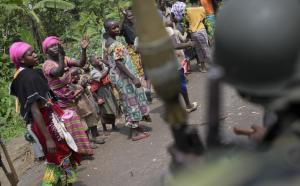
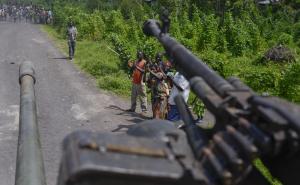
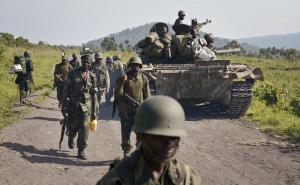
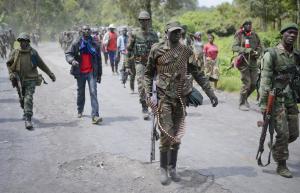
No comments:
Post a Comment